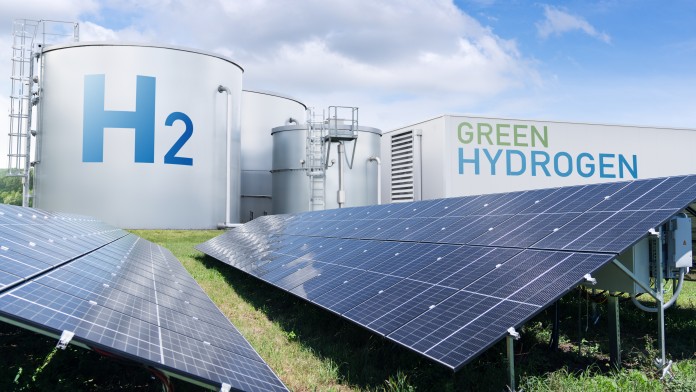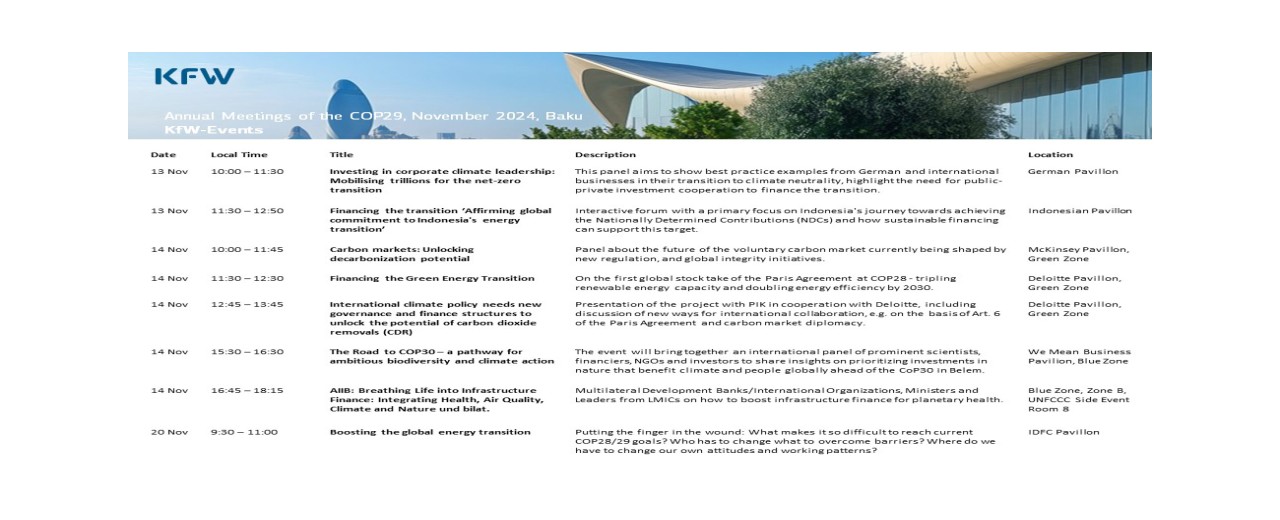Climate action
The 29th Conference of the Parties (COP) of the United Nations Framework Convention on Climate Change (UNFCCC) – COP29 World Climate Conference for short – took place this year from 11 to 23 November 2024 in Baku, the capital of Azerbaijan.
Representatives of governments, international organisations, academics, NGOs and other stakeholders exchanged on measures to combat climate change. The aim of COP29 was to reach a decision on the new global climate finance target (NCQG). A further aim of COP29 was to agree on additional measures for reducing greenhouse gas emissions and adapting to the effects of climate change.
KfW plays an important role in financing projects for sustainable development and climate action. Through the further development and redesign of promotional products, processes and partnerships, KfW is breaking new ground – and helping to shape future trends. For example, KfW offers domestic promotional programmes for climate-friendly residential buildings, climate protection measures in companies and venture capital activities. Via its business sector KfW Development Bank and its subsidiaries DEG and KfW IPEX-Bank, it is supporting climate and environmental action around the world. In Germany, it promotes sustainable housing construction and supports SMEs as well as innovation and technology companies in areas such as the circular economy and electromobility. Abroad, it strengthens partner countries as well as the German and European export industry, in particular in the areas of renewable energies, energy efficiency, biodiversity, environmentally friendly mobility and climate change adaptation.
This is just one of the reasons why KfW as a bank committed to responsibility was participating in this year’s Climate COP with a delegation from the Executive Board and various other business units. In Baku, the delegates took part in panel discussions, specialist sessions, presentations and other events. In doing so, they played a key role in strengthening global efforts to combat climate change.
After difficult negotiations, the climate summit in Baku was able to agree on a joint final declaration, which can be seen as a positive signal. However, the agreed financial commitments for climate protection turned out to be lower than hoped for.
The reduction of global CO2 emissions is progressing too slowly. Although the agreed target of USD 300 billion is an important step in the right direction, one thing is clear: the climate damage, which will be accompanied by considerable cuts for people and the economy, will be associated with very high monetary costs.
In order to be able to absorb these costs, considerable investment is needed - from the state and also necessarily involving private capital, which would have to be mobilised through a new financial architecture. This requires suitable and fair framework conditions to unleash the mechanisms of the market.
Carbon markets need to evolve. Article 6 of the Paris Agreement can play a fundamental role for carbon markets 2.0. In order to harmonise the carbon markets, Article 6 should be implemented quickly. KfW is ready to promote the development of the new market - for example by supporting companies in Germany and Europe, but also European governments in accessing the carbon markets and including high-quality carbon credits in their net-zero strategies.

KfW promotes the use of green hydrogen worldwide, focussing on technologies known as ‘Power to X’, which use electricity generated from wind or solar power.

KfW supports climate protection and biodiversity worldwide on behalf of the German Federal Government.
(Source: KfW / Thomas Schuch)
As of 11 November 2024
Share page
To share the content of this page with your network, click on one of the icons below.
Note on data protection: When you share content, your personal data is transferred to the selected network.
Data protection
Alternatively, you can also copy the short link: https://www.kfw.de/s/enkB2zF4
Copy link Link copied